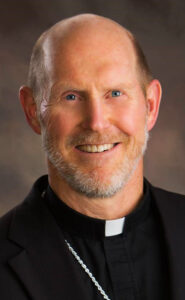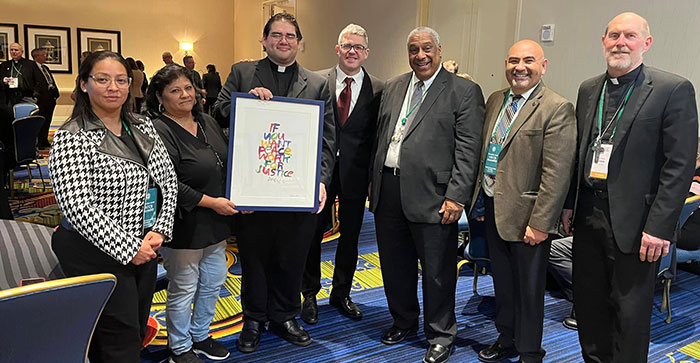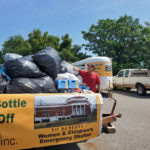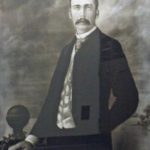By Barb Arland-Fye
The Catholic Messenger
Reflecting on his experience at the U.S. Conference of Catholic Bishops’ fall general assembly Nov. 14-17 in Baltimore, Bishop Thomas Zinkula focused on the value of building relationships.

Fraternal dialogue and the replacement of long rows of tables with round tables lessened the corporate feel of the meetings and encouraged fruitful discussion, Bishop Zinkula said. Two fraternal dialogues took place, with about 15 bishops in a group. “This way, everybody talks, so we get a better sense of where the bishops as a whole are on topics and we’re building fraternity and getting to know one another.” The opportunity for prayer and eucharistic adoration throughout the assembly built on attentiveness to the Holy Spirit’s guidance, he added.
Archbishop Christophe Pierre, the papal nuncio, gave the opening address. “He’s good at seeing the bigger picture, observing what’s happening in the U.S. He’s not afraid to say what he thinks, but his approach is diplomatic.” The nuncio told the bishops that spreading the Gospel message is particularly important “as we live through a time of accelerated change,” Catholic News Service (CNS) reported. The archbishop said “one way to determine if the Church is following its missionary role is to look at how local churches are functioning as evangelizing communities.” He sees evidence of that effort in the current eucharistic revival in the U.S.
Archbishop José Gomez of Los Angeles gave his final speech as USCCB president, which Bishop Zinkula described as “quite good.” The archbishop reflected on the tumultuous times of his tenure, which included a pandemic, unrest in the nation’s cities, a contentious presidential election, widening political, cultural and economic divides, war, the refugee crisis and the overturning of Roe v. Wade. The archbishop also sees reason for hope. “The vast majority of our neighbors still believe in God,” he said. “Tens upon tens of millions of Catholics still serve God every day, and we are making a beautiful difference in the life of this country” (CNS).
Bishop Zinkula described a poignant presentation in which Mark Williams, a victim-survivor of clergy sexual abuse, spoke, as did the Church leader who listened to his cry for help, Cardinal Joseph Tobin of Newark, New Jersey. “Williams loves the Church and his Catholic faith and he talked about how he’s had to walk this journey of being a victim-survivor while remaining Catholic. He said he needed to forgive his abuser and he has. He made the point twice I think, to forgive but not exonerate. Abusers need to be held accountable,” Bishop Zinkula said.
Williams thanked Cardinal Tobin for his support, trust and presence, which has led to a strong bond between the two. “Williams said the 2002 charter was necessary and prophetic. His healing has come by being heard when he called out for help. He said the charter must continue to evolve and there must be accountability at every level. He said those who were abused hunger to walk with bishops, to share Eucharist, to share the suffering of Calvary.”
Cardinal Tobin, who spoke after Williams, talked about the challenging but necessary work of listening to and walking with victim-survivors. The cardinal “talked about the art of accompaniment, removing our sandals before standing on the sacred ground of another,” Bishop Zinkula said. Cardinal Tobin was hurting, too, because of the McCarrick scandal, which broke in 2018 and re-triggered Williams’ trauma. The cardinal described that period as the most difficult of his life. McCarrick, the laicized former cardinal credibly accused of sexually molesting minors and adult seminarians, led the Newark Diocese from 1986-2000.
Speaking afterwards was Bishop James Johnston Jr. of Kansas City-St. Joseph, Missouri, who served as chair of the Committee on the Protection of Children and Young People. Bishop Zinkula serves as a regional representative on the committee. Bishop Johnston said the past 20 years have been a time of growth, awareness and conversion as the Church works to provide a safe environment and to restore justice. His apology on behalf of the bishops to victim-survivors and their families was heartfelt, Bishop Zinkula said. The bishops prayed the Litany for Hope and Healing, written by Spirit Fire, a fellowship of survivors of abuse within the Church, and sang the Salve Regina at the request of Spirit Fire.
A presentation by Archbishop Borys Gudziak of the Ukrainian Catholic Archeparchy of Philadelphia also moved Bishop Zinkula deeply. “He was very eloquent, very passionate about the situation in Ukraine. He thanked the Church in the U.S. and the bishops for their support and encouraged dioceses to welcome Ukrainian families,” Bishop Zinkula said. The archbishop asked for prayers for the Ukrainians and invited the bishops to visit Ukraine.
Archbishop Gudziak described the magnitude of Russia’s invasion of Ukraine — 7 million families without electricity, nearly 120,000 houses destroyed, over 1,000 health care facilities and 3,000 schools damaged or destroyed, 23% of agriculture production wiped out and millions of windows broken. “Think about what that must be like, in weather similar to Chicago or Minnesota,” Bishop Zinkula said. He was encouraged to learn that Catholic Social Teaching has taken hold in Ukraine because of the Church’s preaching and teaching over the years and that President Volodymyr Zelenskyy uses that teaching in his messages.
An update on the National Eucharistic Revival, a three-year initiative, emphasized an essential goal, Bishop Zinkula said, an encounter with Jesus in the Eucharist that leads Catholics to a conversion and sends them on mission to lead others to the faith.
A presentation by the National Advisory Council included a suggestion for the bishops to develop practical and pastoral guidance on gender dysphoria to help laypeople and clergy in their parishes, schools and other settings. The Diocese of Davenport’s Gender Committee has been studying and wrestling with this issue for nearly two years.
“Currently, families, parishes and schools are daily encountering difficult conversations with their children and feel ill equipped to explain or accompany them through this journey,” said the council’s chair, Mark Sadd in his report. “Gender dysphoria” describes a sense of unease or distress that a person may experience by sensing a mismatch between their biological sex and their gender identity.
Also during the assembly, Bishop Zinkula was invited to present an award to one of his priests — Father Guillermo Treviño. The Catholic Campaign for Human Development (CCHD) chose Father

Father Guillermo Trevino was honored with the Catholic Campaign for Human Development’s Cardinal Bernardin New Leadership Award during the USCCB conference Nov. 15. See related story on Page 2.
Treviño to receive its 2022 Cardinal Bernardin New Leadership Award, which honors young adults “who demonstrate leadership in fighting poverty and injustice in the United States through community-based solutions.”
In good humor, Bishop Zinkula shared some details about Father Treviño that the guests, including several cardinals, would not have known about from his bio. The priest is a huge Star Wars fan, loves going to the movies and is an aficionado of professional wrestling! Father Treviño shared a very personal reason for his love of professional wrestling. His parents, Maria and the late Guillermo Treviño Sr., met at a professional wrestling event.











